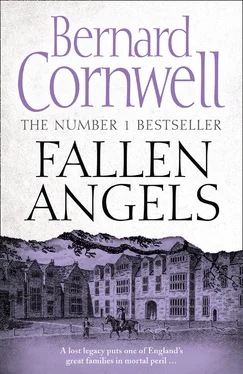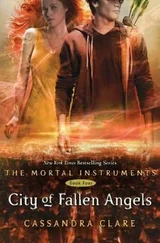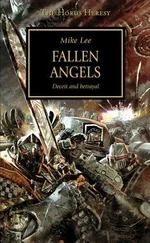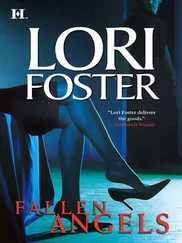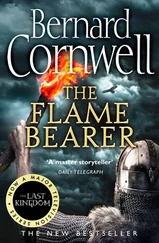There was a belief that the Castle was cursed.
The Earl was dying, drunk when he was awake, racked by pain when he awoke.
The Countess was dead, killed giving birth to a stillborn child.
The eldest son, who would have inherited Lazen, had been burned to death with his wife and child.
Lazen, the house of fortune, seemed cursed in all things but its daughter.
A servant piled coals on the fire. Campion still held her father’s hand and she stroked his face as if she could drive her love through his insensibility. She prayed for the doctor to come quickly, that her father would not die, that he would live, at the very least, long enough to see Toby married.
Toby was her brother, the new heir, Viscount Werlatton. He was in Paris, a member of the British Embassy there, and now that the French had imprisoned their King and the revolution was turning bloodier by the day, he was coming home. He was bringing a bride with him, a dark-haired French girl of winsome and fragile beauty. There would be babies soon in Lazen and Campion was glad. Lazen needed babies, and she prayed that this pale, bleeding man would live to see them.
There was the sound of running footsteps, she turned, and William Carline, the Castle’s ponderous steward, appeared breathless at the door. ‘My Lady?’
‘What is it?’ She knew it was bad news. She could tell by his face, paler than ever, and by the flicker of panic that ran like lightning among the servants.
‘It’s Doctor Fenner, my Lady. He’s not home. They say he’s gone to Millett’s End.’ Carline’s voice trailed away.
All the servants stared at her. She was twenty-four and on her slim shoulders rested this great house and all its possessions.
She lifted the blanket to look at the stump of her father’s leg. She thought there was more blood on the linen, and she knew her father was going to die unless she acted swiftly. ‘Carline?’
‘My Lady?’
‘I want you to go to the stables, please, wake Burroughs, and ask for the horse needles and thread.’
He blinked, then nodded. ‘Yes, my Lady.’
‘I want water, Caleb.’ She was trying to think of what else she would need. Candles, linen, and courage.
Her maid stared wide-eyed at her. ‘You’re going to sew him up, my Lady?’
‘And you’re going to help me.’
The storm had blown itself out by the time she had finished. She had untied the crude bandage, washed the stump, tied the broken artery, then, taking the flap of skin, stitched it into place. She had worked from instinct, doing what seemed to be necessary, frowning when the fragile skin tore under the thread’s pull. Edna had held a candle close to her hands while Caleb and another servant held her father still.
Now, the room thick with the smell of lymph and blood, she untied the silken bed cord from her father’s thigh. She watched in fear as the white skin flushed red with the released blood, the flush going ever closer to the newly closed wound, but, to her relief, the stitches held. A few drops seeped, but nothing more.
Her father would live, to know more pain and to count the slow hours of death’s kingdom. Yet, Campion knew, he would also live to see his son come home with a bride to fill the Castle with new life, fresh laughter, and the bright hope of glittering days that would obscure the memories of these dark nights.
Her father slept. Campion carried the hooked horse needles and gut out of the door, and the servants, who waited outside, looked to her for reassurance. She smiled at them. ‘All’s well, and thank you all.’
She walked slowly back to her rooms. She was Lady Campion Lazender, she was twenty-four, lovely as the dawn, and she had woken to a nightmare. Yet this night, in his own kingdom, she had cheated the reaper with his skull-grin, defeated him by her courage, but he would be back. He always came back. She warmed her hands by her fire, waited for the sunrise, and prayed for her brother to come home from Paris.
Fear, like the rumour of plague, can empty a city’s streets.
Paris, on that hot September evening of 1792, seemed empty. The citizens stayed behind closed doors as though, after a week of slaughter, they were suddenly ashamed of the horrors they had fetched on their city. There was a silence in Paris, not an absolute quiet, but a strange, almost reverent, hush in which a raised voice seemed out of place.
Fear, on that evening, smelled like a charnel house.
Four horsemen rode through the streets. There was a menace in the sound of their hooves, a menace that made the hidden, listening citizens hold their breath until the sound passed. Death had become a commonplace that week, not decent death at sickness’s end, but the death of the slaughterhouse. The hollow sound of the hooves was urgent, as if the horsemen had business with the horrors that had choked Paris’s gutters with blood.
It was a hot evening. If it had not been for the stink in the city it would have been a beautiful evening. The roofs were outlined with startling clarity against a water-colour sky. Clouds banded the west where the sun, like a huge, blood-red globe, was suspended over the horizon.
The whole summer of 1792 had been hot. The soldiers who had gone north to fight the invading Austrians and Prussians had marched through Paris with a grime of sweat and dust caked on their faces. Rumour said that those soldiers were now losing the war on France’s northern frontier, and that too had made this city fearful.
The summer had been so hot that the leaves, withered and dry, had fallen early. On the day that the King was taken prisoner, he had walked from the Tuileries Palace to the National Assembly and his son, the dauphin , had kicked the piles of fallen leaves into the air as if it was a game. That had been the second week of August, only the second week, yet the leaves had fallen. Never, it was said, had there been a summer so hot, a heat that had not diminished as autumn came, that turned the corpses into the stench which fouled the exhausted city.
The four horsemen rode into a square where martins dipped over the darkening cobbles. They slowed their horses to a walk.
Facing the four men was a great building with an imposing archway. The gates were open. In the entrance of the building was a small crowd, oddly cheerful and noisy on this evening of silence and fear. The people in the small crowd were tired, yet the bottles from which they drank, and the memories of their great day, gave them a feverish energy and ebullience. Nearly all of them wore soft red hats that sat rakishly on their long hair.
The oldest of the four horsemen motioned with his hand for his companions to hold back while he rode on alone. The crowd, eager for more excitement, came to meet him.
The horseman looked over the group. ‘Who’s in charge?’
One man stepped forward, a man with a great belly that sagged over the rope belt of his trousers. He looked up at the horseman and then, instead of answering, took a slow drink from his bottle. When he had finished all the wine, he belched. The crowd laughed. The fat man, pleased with his performance, spat, and looked truculently at the rider. ‘And who, citizen, are you?’
The horseman took a folded square of paper from a pouch on his belt and handed it wordlessly to the fat man who made a great pantomime with it. First he handed his empty bottle to a companion, then he brushed his moustache, then he planted his feet wide, and finally, with a flourish, he shook the square of paper open.
He read it slowly, his lips moving. He frowned, looked suspiciously at the horseman, then turned the paper over as though its blank reverse might hold an answer to his puzzlement. He turned it back.
He stared at the signature at the foot of the paper. He stared at the seal. ‘You’re from the English Embassy?’
Читать дальше
